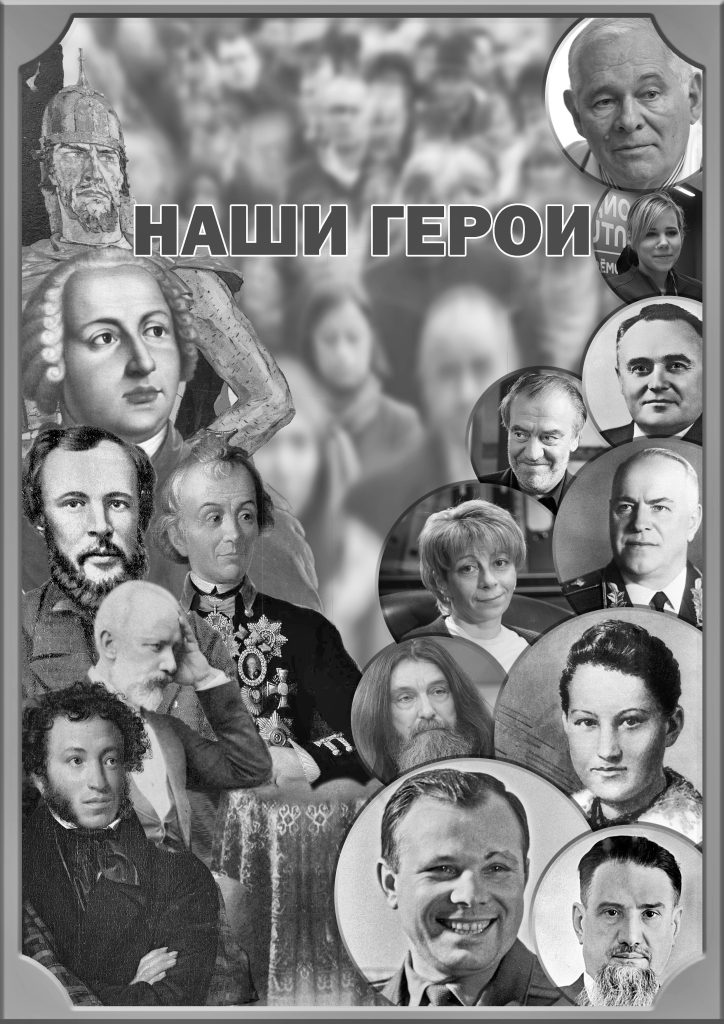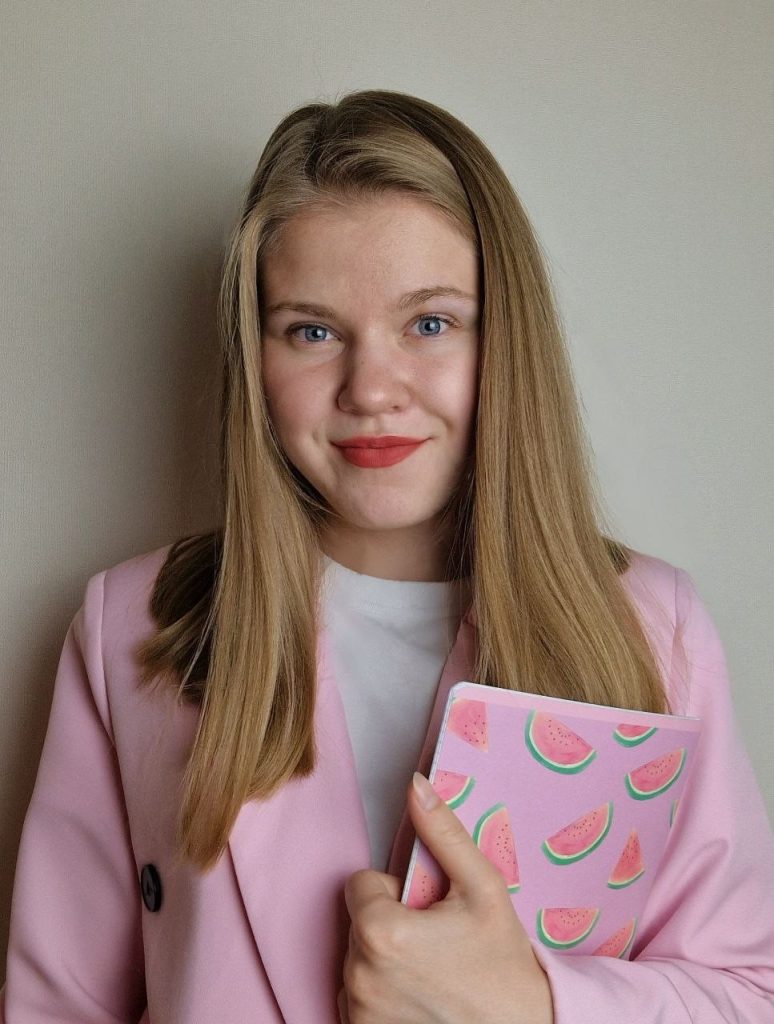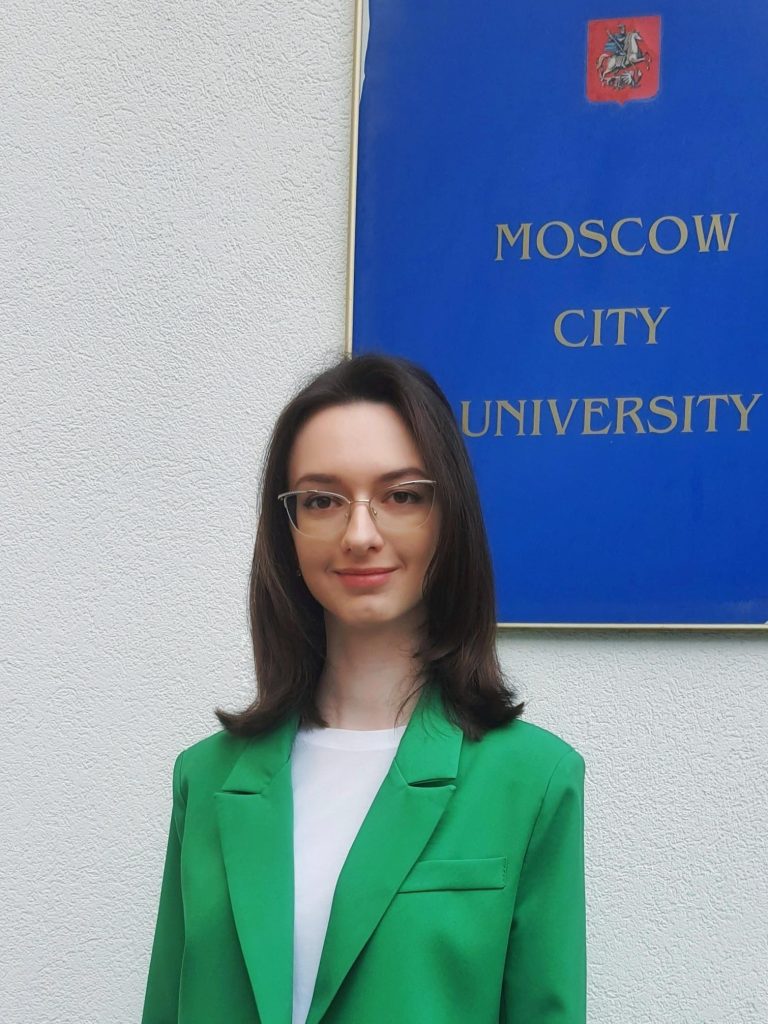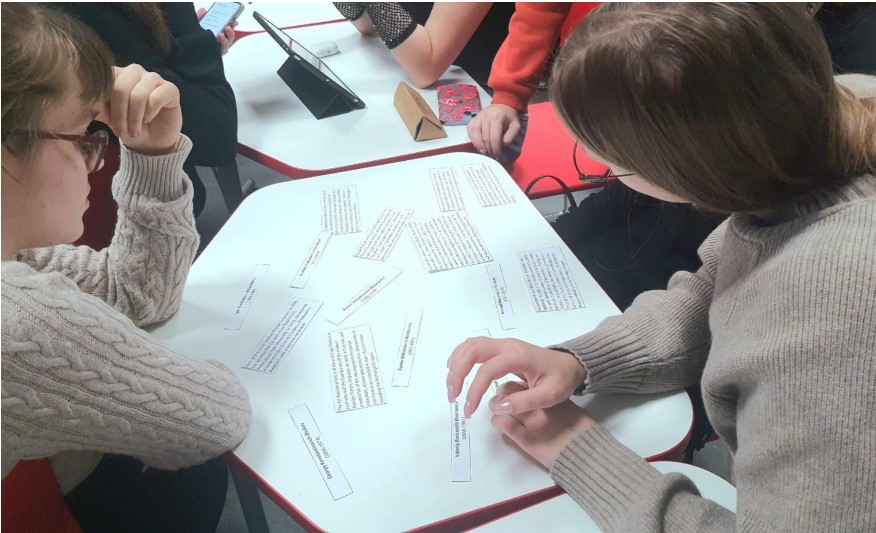ВОСПИТАНИЕ ПАТРИОТИЗМА В РАМКАХ ВНЕУРОЧНОЙ РАБОТЫ НА АНГЛИЙСКОМ ЯЗЫКЕ
Автор: Коллектив АВТОРОВ | Рубрика: ВНЕУРОЧНАЯ РАБОТА Четверг 8 февраля 2024
“Народ, не знающий своё прошлое, не имеет будущего”
М.В. Ломоносов
Внеурочная работа с обучающимися на любой ступени образования направлена на комплексное развитие личности, одно из направлений которой является духовно-нравственное воспитание. Данный аксиологический компонент позволяет сформировать категории ценностей и установить отношение обучающихся к ним сквозь призму явлений действительности.

Автор: Воевода Екатерина Олеговна, студент 4 курса ГАОУ ВО МГПУ ИИЯ

Автор: Фомина Анастасия Дмитриевна, студент 4 курса ГАОУ ВО МГПУ ИИЯ
На сегодняшний день особенно актуальным является вопрос воспитания в современном поколении качеств добросовестного гражданина и патриота, проявляющего чувства ответственности и гордости за свою Родину, понимающего ценность истории, выражающего уважение и взаимопонимание при взаимодействии с людьми нашей многонациональной страны.
В образовательных организациях подобная инициатива поддерживается добавлением в учебный план дополнительных дисциплин: к примеру, в школах – “Разговоры о важном”, в вузах – “Основы российской государственности” и др. Также во время урочной деятельности данная тема поддерживается на самых разнообразных предметах, включая “Иностранный язык”, в частности, английский.
Однако не всегда воспитание патриотизма на уроках английского языка можно организовать в полном объеме вследствие определенного плана программы. В связи с этим, целесообразным выходом из ситуации является организация внеурочной работы на иностранном языке, т.к. подобная деятельность не только позволит обучающимся осознать российскую гражданскую идентичность посредством знакомства с различными материалами, предлагаемыми педагогом, но и даст возможность проявить свои языковые навыки и умения на иностранном языке, общаясь на данную тематику.
Умение рассказать о своей стране, ее героях и достижениях, истории на английском языке способствует распространению информации о российских ценностях в рамках межкультурной коммуникации с представителями других стран и народов, что, несомненно, поможет прийти к взаимопониманию и установлению контактов.
Ввиду этого, предлагается провести внеурочную работу с обучающимися ко Дню народного единства, который является одним из важных дней, позволяющим всем гражданам страны вспомнить об истории России, наследии многонационального российского общества, стать более сплоченными и почувствовать единение. Работа началась с помощью метода “проблемного” обучения: прочитав переведенные на английский язык строки гимна РФ, обучающиеся самостоятельно вывели тему предстоящего мероприятия. Далее была представлена презентация об истории праздника (см. табл. 1). На данном этапе были актуализированы уже имеющиеся знания у обучающихся, представлен исторический контекст праздника и подчеркнута его роль в истории становления Российской государственности. Обучающиеся узнали о центральном историческом событии и выдающихся личностях, таких как Кузьма Минин и Дмитрий Пожарский, освободивших Москву от польской оккупации [1].
| Anthem Be glorious, our free Fatherland, A centuries-long union of brotherly nations, Popular wisdom given us by ancestors. Praised be our country! And we’re proud of thee! |
| Historical background The roots The history of the Russian Unity Day dates back to the Time of Troubles or Smuta (1598-1613) – a turbulent period in Russian history characterized by social and political crises with ongoing wars with Sweden and Poland. Being in civil unrest, Russia fell victim to the Polish–Lithuanian Commonwealth, which invaded the country and occupied Moscow. The city was under occupation for two years up until 1612 when Kuzma Minin, a merchant from Nizhny Novgorod, and Dmitry Pozharsky, a high-ranking prince, led a historical uprising and freed the city from the aggressors. The two became national heroes and the day received the status of a national holiday by order of tsar Mikhail Romanov (1596-1645) in 1613. The Day of Moscow’s Liberation from Polish invaders symbolized the country’s unity against a common enemy and was celebrated until 1917. |
| Modern Russia In 2005, President Vladimir Putin reintroduced Unity Day. Ever since, November 4 has been known as National Unity Day in Russia – a day meant to promote patriotism and solidarity between different ethnic groups. |
| Celebrations Traditionally, for the celebration national flags are hoisted and an exciting program full of parades, fireworks, entertainment and cultural events is created. People appreciate their official days off and take this time to be with their families and close people. |
Таблица 1. Исторический контекст
На следующем этапе в рамках первого тура был применен метод “обучения в сотрудничестве”, во время которого обучающиеся разделились на две команды. Было предложено соединить карточки с именами героев России разных периодов (дореволюционный, советский и современный) с различными фактами о них: биографическая справка, достижения, открытия, награды, влияние на ситуацию в стране и т.д. (см. рис. 1, табл. 2). Использованная форма работы способствовала развитию соревновательного духа и умения работать в команде, а также развитию умения ознакомительного чтения при работе с текстами на английском языке.
Обучающиеся ознакомились и актуализировали уже имеющиеся знания о героях России и успешно использовали их при выполнении задания. Среди героев были отмечены имена таких личностей, как Федор Михайлович Достоевский, Антон Семёнович Макаренко, Юрий Алексеевич Гагарин и многие другие.
Данное задание станет основным ресурсом для ответа на вопросы викторины в следующем туре.

| Vladimir I Sviatoslavich the Great (Saint Vladimir) (about 960-1015) |
| Grand Prince, who is known for the Christianization of Kievan Rus’. Played an exceptional role in strengthening and developing the state. Built the church of the Tithes. A symbol of Christian Russia, a lot of monuments and places are associated with him. |
| Mikhail Vasilyevich Lomonosov (1711-1765) |
| The 1st Russian scientist of world significance, a poet who laid the foundations of the modern Russian literary language, an artist, a historian, and a supporter of the development of national education, science and economics. Monuments to him have been installed in many Russian cities, including the Arkhangelsk region. |
| Mikhail Illarionovich Kutuzov (1747-1813) |
| An outstanding military leader, statesman and diplomat. His acts of personal bravery brought him not only numerous awards, but also two wounds in the head, both of which he survived. During the Patriotic War of 1812, he served as Commander-in-Chief of the Russian Army, defeated Napoleon’s army and expelled it from Russia. He raised the Russian military art to the highest level. |
| Dmitri Ivanovich Mendeleev (1834-1907) |
| An outstanding Russian scientist and encyclopedist. He discovered the periodic law of chemical elements, one of the fundamental laws of natural science. He is the author of the book «The Principles of Chemistry» and conducted fundamental research in physics, metrology, aviation, meteorology, agriculture, economics, and public education, all closely tied to the needs of Russia’s economic development. |
| Fyodor Mikhailovich Dostoevsky (1821-1881) |
| A great Russian writer, one of the best novelists in the world, a connoisseur of human psychology and a philosopher. He is the author of novels such as «The Idiot», «Crime and Punishment», «Humiliated and Insulted», «The Brothers Karamazov,» and other works that are treasures of world literature. |
| Pyotr Ilyich Tchaikovsky (1840-1893) |
| A Russian composer and conductor. He is one of the greatest composers in the world and the author of more than 80 musical works, including the famous ballets «The Nutcracker» and «Swan Lake». |
| Alexander Stepanovich Popov (1859-1906) |
| A Russian physicist and electrical engineer, professor, the 1st Russian radio technician, the founder of radio engineering scientific school and inventor in the field of radio communication. |
| Anton Semyonovich Makarenko (1888-1939) |
| An outstanding teacher and writer. He developed his own corrective system of re-education of difficult children. For twelve years, he headed the colonies for juvenile delinquents, and ensured that all his pupils grew up worthy people. He was the author of numerous works, with the «Pedagogical Poem» being the most notable. |
| Georgy Konstantinovich Zhukov (1896-1974) |
| A great commander, state activist, Marshal of the Soviet Union, four times Hero of the Soviet Union. During the Great Patriotic War of 1941-1945, he held the position of chief General Staff, Deputy Supreme Commander-in-Chief. He got a popular nickname «Marshal of Victory». It was him who was tasked with accepting the unconditional surrender of Germany on the night of May 8-9, 1945. On June 24, 1945, he hosted the historic Victory Parade on Red Square in Moscow. In the post-war period, he served as commander-in-chief of the ground forces, and was the Minister of Defense of the USSR. |
| Igor Vladimirovich Kurchatov (1903-1960) |
| A scientist and physicist, a three-time Hero of Socialist Labor, a recipient of the Lenin Prize, and the State Prizes of the USSR. In 1959, he was awarded the Silver Medal of the World Peace Council named after Joliot-Curie for his outstanding work in the field of nuclear physics and nuclear energy. |
| Sergey Pavlovich Korolev (1907-1966) |
| A remarkable designer and scientist who worked in the field of rocket and space technology. He received the Hero of Socialist Labor award twice, won the Lenin Prize, and was an academician of the USSR Academy of Sciences. He was the creator of Russian strategic missile weapons and was the founder of practical cosmonautics. |
| Yuri Alekseyevich Gagarin (1934-1968) |
| The first cosmonaut in the world, the Hero of the Soviet Union. From May 23, 1961 he was the commander of the cosmonaut squad. In 1963, he was appointed Deputy Training Director of the Cosmonaut Training Center. In 1968 he graduated from the Zhukovsky Air Force Engineering Academy. |
| Valeriy Borisovich Kharlamov (1948-1981) |
| An exceptional Soviet hockey player, a famous forward for CSKA (Central Sports Club of the Army) and the Soviet Union national team, a multiple world champion and Olympic champion, whose fame went far beyond the borders of his homeland. |
| Lyudmila Alekseevna Verbitskaya (1936-2019) |
| One of the most famous Russian linguists. In 1994, she became the 1st woman to head St. Petersburg State University. In 2013, she became President of the Russian Academy of Education. Awarded with international awards. |
| Leonid Mikhailovich Roshal (born in 1933) |
| A Russian surgeon, public figure, world-famous pediatrician, professor of medicine and the organizer of the «flying» team of doctors who have been providing assistance to children during wars, emergencies, and worldwide disasters since 1998. Now he heads the Moscow Scientific Research Institute of Pediatric Surgery and Traumatology. He is the founder of numerous medical and scientific disciplines and scientific works. He helps children even in the most challenging and neglected situations. |
| Fyodor Filippovich Konyukhov (born in 1951) |
| A world-famous traveler, writer, artist, and priest. He has completed 5 solo circumnavigations, crossed the Atlantic 17 times, including on a rowing boat, and became the first Russian to reach 7 peaks — the highest peaks of all parts of the world. He also conquered the South and North Poles alone. |
Таблица 2. Исторические личности.
Второй тур включал в себя викторину по историческим событиям и личностям на основе выполненного задания и прослушанной презентации. Данное задание направлено на развитие умений поискового чтения. Обучающимся были предложены следующие вопросы для работы в группах (см. табл. 3).
| 1. Who’s the first Russian radio technician? (Alexander Stepanovich Popov) |
| 2. Who served as Commander-in-Chief of the Russian Army during the Patriotic War of 1812? (Mikhail Illarionovich Kutuzov) |
| 3. Who was the founder of practical cosmonautics? (Sergey Pavlovich Korolev) |
| 4. Who’s a three-time Hero of Socialist Labor? (Igor Vladimirovich Kurchatov) |
| 5. Who became the first Russian to reach 7 peaks — the highest peaks of all parts of the world? (Fyodor Filippovich Konyukhov) |
| 6. Who was the first woman to head St. Petersburg State University in 1994? (Lyudmila Alekseevna Verbitskaya) |
Таблица 3. Вопросы о героях России разных периодов.
После просмотра тематического видео о субъектах Российской Федерации на английском языке [2], которое в увлекательной форме перечислило все города федерального значения, области, республики, края и т.д., тем самым показав многонациональность российского общества, заключительным заданием было креативное оформление плаката для систематизации изученной информации. В плакатах использовались как государственные символы России, так и символы единства народов России (см. рис. 2).

Рис. 2. Плакаты к празднику.
Таким образом, проведенная внеурочная работа, посвященная Дню народного единства, способствовала патриотическому воспитанию подрастающего поколения благодаря ознакомлению с историей праздника и изучению выдающихся героев разных периодов истории России; социокультурному образованию обучающихся посредством развития их мировосприятия и национального самосознания, а также практической задачи по развитию умений ознакомительного и поискового чтения на английском языке.
Литература
- Belyaeva M. Historical Flashback: The Story Behind Unity Day in Russia // Itmo News. – 2021. [Элетронный ресурс] URL: https://news.itmo.ru/en/features/life_in_russia/news/12205/ (дата обращения 30.10.2023)
- Russian Federation – Federal Subjects & Geography // YouTube. – 2016. [Элетронный ресурс] URL: https://www.youtube.com/watch?v=mmHsKdpPTPk (дата обращения 30.10.2023)





















